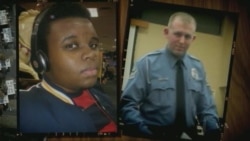The August 2014 shooting of unarmed black teenager Michael Brown by white police officer Darren Wilson in Ferguson, Missouri, re-ignited long-standing racial tensions in the predominantly African-American community, touching off days of riots and angry demonstrations.
Now residents await a grand jury decision on whether or not to indict the shooter: a decisive chapter in a story some Americans know all too well. Cases involving allegations of excessive force by police have sparked racial violence in the past.
According to Sam Fulwood, a senior fellow at the Washington-based Center for American Progress, racial unrest often stems from frustration among young African-Americans who believe the system does not work for them.
"You have racial discrimination. You have police brutality. You have economic disparity. You have housing discrimination. All of those things breed resentment," he said. "They [African-Americans] are demanding to be heard on a par with the elite in our society, and that's the underlying cause."
The violence in Ferguson comes 23 years after outrage over the infamous videotaped beating of African-American Rodney King by white Los Angeles police officers. Their acquittal on excessive force charges in April, 1992, immediately touched off some of the worst rioting in U.S. history. The victim himself called for calm and racial harmony, when he said, "I just want to say: can we all just get along?"
Despite pleas for peace, 55 people died and more than 2,000 were injured in Los Angeles. Fires and looting caused more than $1 billion in property damage.
Public policy expert Elsie Scott says African Americans who lash out often feel disenfranchised.
"I think many of the people you find that participate in the riots are people who feel like they don’t have power, and the only power that they have is to go out and set a business on fire that they cannot own," she said.
In April 2001 police clashed with protesters after the shooting death of an unarmed black teenager by a white police officer in Cincinnati, Ohio. As in Ferguson, racial battle lines were drawn between the mostly-white police force and the black community.
Cincinnati police officer Keith Fangman says more needs to be done in the black community to change attitudes about how police do their job.
"We need black leaders especially to come forward and say we will publicly support an officer who uses reasonable justified use of force when encountering violent suspects," he said.
Some African American leaders say racial unrest could reignite again if minority communities continue to feel they're the target of police officers who use excessive force or do not enforce laws fairly or objectively.





